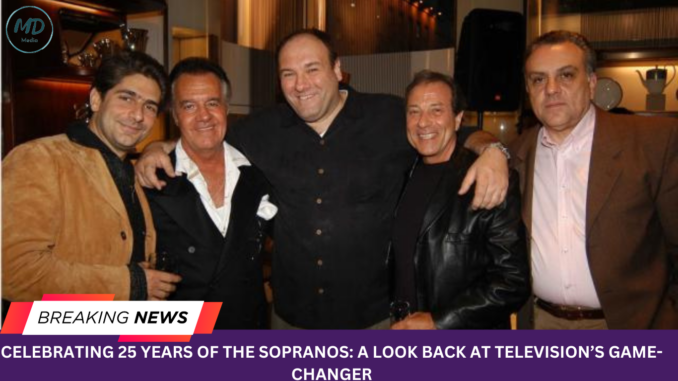
This year marks a significant milestone: the 25th anniversary of The Sopranos, a groundbreaking HBO series that revolutionized television storytelling. From its complex characters to its blend of drama and dark humor, the show set a new standard for what TV could achieve. Let’s dive into the legacy of this iconic series and reflect on its enduring impact.
The Birth of a Cultural Phenomenon
When The Sopranos debuted in 1999, few could have predicted the impact it would have on the television landscape. Actress Edie Falco, who portrayed Carmela Soprano, initially had no clue what the show was about. “I thought it was about singers,” she admitted, showcasing the initial confusion around the show’s title.
Steve Van Zandt, who played Silvio Dante, had a similarly hesitant response. He recalled, “He calls and says, ‘You wanna be in my new TV show?’ And I say, ‘Yeah, no thanks!’” It’s hard to imagine now, but many actors were unsure about the project.
A Darkly Brilliant Concept
Creator David Chase faced considerable skepticism from networks, with many deeming the show “too dark.” Yet, Chase’s vision was more than just a mob story; it was a deep dive into the human psyche. “I guess it’s like life,” he mused, reflecting on the show’s ambiguous tone.
The series initially revolved around Tony Soprano, a mob boss juggling the pressures of organized crime with personal turmoil, particularly his fraught relationship with his mother. Chase’s own experiences growing up in New Jersey influenced this portrayal, bringing authenticity to the narrative.
“If my mother had been male, she might have been a criminal,” he joked about the character’s inspiration.
This blend of realism and fiction made The Sopranos resonate deeply with viewers, setting the stage for its phenomenal success.
The Dynamic Cast: Bringing Characters to Life
The chemistry among the cast was palpable, with each actor contributing to the show’s authenticity. James Gandolfini’s portrayal of Tony Soprano was particularly noteworthy. Chase described Gandolfini as “incredible,” emphasizing the power of his eyes in conveying complex emotions.
Falco and Gandolfini’s on-screen relationship was described as a natural fit. “It was a matter of alchemy,” she said, noting their shared cultural background helped shape their performances. This authenticity translated into a captivating depiction of marriage, power struggles, and family dynamics.
Behind the Scenes: The Challenges of Filming
While the final product was nothing short of phenomenal, the production process was no walk in the park. Gandolfini often faced immense pressure, expressing frustration about the demands of the role. The cast would gather after long shooting days, discussing their shared challenges. Van Zandt noted, “Every other day, we would go to a bar. He’d say, ‘I’m done. I’m not going back.’”
The long hours—sometimes 14-hour days—were taxing, but the passion for the project kept the team committed. Michael Imperioli, who played Christopher Moltisanti, reflected on the exceptional quality of the writing. “Script after script, it would get more interesting and deeper,” he said, emphasizing how the series maintained high standards throughout its run.
A Legacy That Endures
After its initial airing, The Sopranos quickly became a cultural touchstone. Its influence extended beyond just entertainment; it sparked discussions about morality, family, and the American Dream. Chase even saw the show as a commentary on America’s decline during the late 1990s, filled with themes of greed and consumption.
As time passed, the series continued to captivate new audiences. Fans were drawn not only to the compelling characters but also to the show’s nuanced storytelling. “It was like a musician playing Bach,” Falco remarked, capturing the artistic rigor that defined the series.
The Controversial Ending
The series concluded in 2007 with an ending that left audiences divided. The abrupt cut to black during the final scene sparked debates about its meaning. Imperioli recalled his initial reaction: “Did the TV go out? Like everybody!” This ambiguity became a hallmark of the show, inviting viewers to interpret the ending in various ways.
Chase himself acknowledged the complexity of the conclusion, stating, “Life is precious,” suggesting that the ending was meant to reflect the uncertainty of existence rather than provide a clear resolution.
Conclusion: A Lasting Impact
The Sopranos reshaped the television landscape, paving the way for future series that embrace complexity and depth. Its legacy endures as a testament to the power of storytelling, character development, and the exploration of the human condition. As we celebrate 25 years since its debut, it’s clear that The Sopranos is more than just a show; it’s a cultural phenomenon that continues to inspire and resonate.
